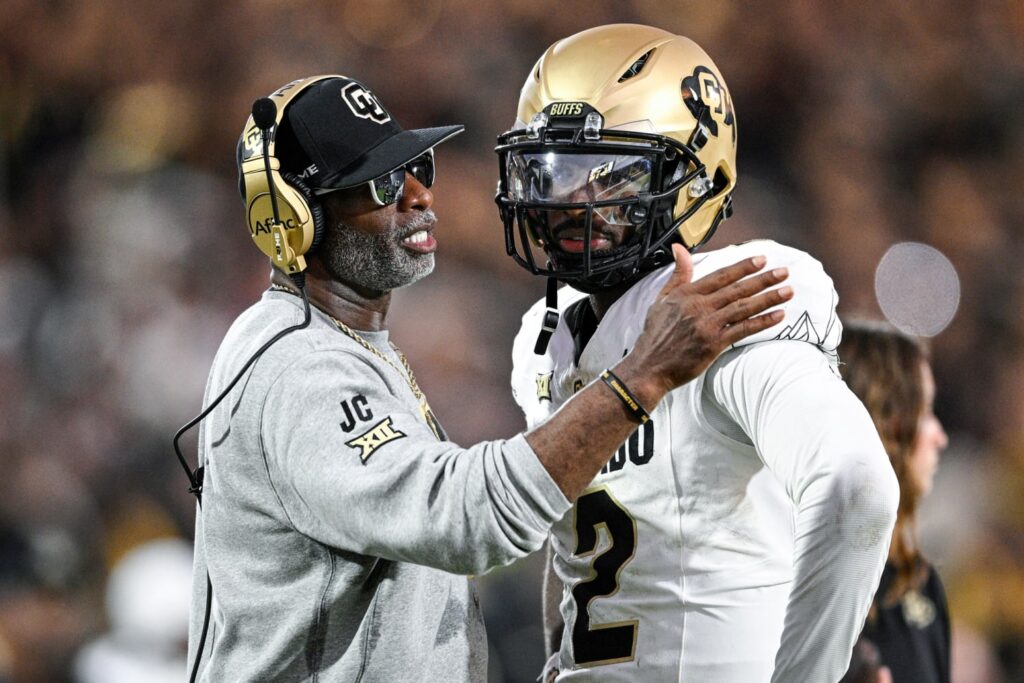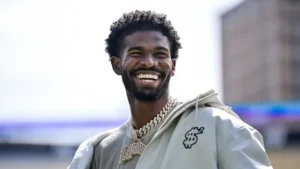
Deion Sanders, known as “Prime Time” during his playing days, carved out a legendary career in both the NFL and Major League Baseball. As one of the most dynamic and charismatic athletes to ever play professional sports, Sanders made a lasting impact on the game of football. He’s a two-time Super Bowl champion, a 1994 NFL Defensive Player of the Year, and a member of the Pro Football Hall of Fame. His career on the field was marked by swagger, brilliance, and a unique ability to make plays when it mattered most.
In recent years, Sanders has transitioned into coaching, first taking the reins at Jackson State University before moving on to coach the University of Colorado Buffaloes. His coaching philosophy is similar to his playing style: bold, brash, and unafraid of the spotlight. Sanders has always believed in himself and his abilities, and that same mentality has carried over to how he handles his son, Shedeur Sanders.
Shedeur, a rising star in college football, is Deion’s son from his first marriage. He was a highly sought-after high school recruit and committed to play for his father at Jackson State, where he quickly emerged as one of the top quarterbacks in the FCS (Football Championship Subdivision). After two successful years at Jackson State, Deion Sanders made the move to Colorado, bringing his son with him. Under his father’s tutelage, Shedeur has developed into one of the most promising quarterbacks in college football, drawing attention from NFL scouts and analysts.
Shedeur’s skill set includes excellent arm strength, precision passing, poise under pressure, and an innate football IQ. These qualities had many projecting him to be a first-round pick in the 2025 NFL Draft, with some experts ranking him among the top quarterbacks in the nation. However, despite his impressive college career, the NFL Draft did not unfold in Shedeur’s favor.
The 2025 NFL Draft: A Snub for Shedeur Sanders?
The 2025 NFL Draft was a highly anticipated event, with many eyes on the quarterbacks eligible for selection. Shedeur Sanders, given his performances at Colorado and his pedigree as the son of one of the greatest athletes of all time, was considered a strong candidate to be taken early in the first round. Yet, when the draft came and went, Shedeur’s name remained absent from the first round. While he was eventually drafted in the second round, many felt his potential warranted a higher selection.
This is where Deion Sanders stepped in, using his platform as a high-profile coach and media personality to voice his displeasure. In a pointed and emotionally charged statement, Deion Sanders called out NFL executives and decision-makers for passing on Shedeur, accusing them of overlooking his son’s talent and making a mistake. He took aim at what he perceived as a bias in the league, suggesting that Shedeur’s success at a school like Colorado—often overlooked in favor of football powerhouses—led to a lack of respect from NFL teams.
Deion’s comments ignited a firestorm of conversation across social media and sports networks. The outspoken coach implied that Shedeur’s status as a quarterback under his father’s tutelage may have played a role in the lack of first-round consideration. He also pointed out how other quarterbacks with similar, or even less, impressive resumes were drafted earlier, which added fuel to his frustration.
Deion’s Comments: Throwing Shade or Legitimate Criticism?
Deion Sanders is no stranger to controversy, and his comments about Shedeur’s draft situation were no exception. But were his words simply an example of a proud father defending his son, or was there a deeper, more legitimate point about the NFL draft process?
- A Father’s Pride: Deion’s comments were, in part, a reflection of his immense pride in Shedeur’s development as a player. As a father, Deion undoubtedly wants what’s best for his son. Seeing Shedeur’s potential and how hard he worked to get to this point, Deion felt the sting of the perceived slight and reacted emotionally. While many would understand this fatherly defense, others might view it as overblown, especially given that Shedeur still got drafted in the second round, a solid outcome for most prospects.
- NFL Biases and the Draft Process: Deion’s criticism also points to a long-standing issue within the NFL draft process: bias and a lack of transparency. NFL teams tend to gravitate toward players from blue-chip programs such as Alabama, Ohio State, or Clemson, and often disregard prospects from smaller schools or less traditionally successful programs. This bias was evident in the way Shedeur’s potential was assessed. Had he played for a more prominent school, many believe he would have received more attention from NFL scouts.
- The “Deion Sanders Effect”: Another part of the conversation revolves around the influence of Deion Sanders himself. As a coach with such a larger-than-life persona, it’s impossible to separate his presence from the perception of Shedeur as a quarterback. While Shedeur’s skills speak for themselves, it’s fair to ask whether NFL executives were influenced by the idea that he might only be excelling because of his father’s involvement. There’s often an implicit bias against players from powerful legacies, with the assumption that their success is owed to their family’s name rather than their own ability.
- Draft Trends and NFL Prejudice: The NFL draft has its own set of trends and traditions that sometimes come at the expense of talent. Teams frequently pick players from well-known programs in the hope that they’ll be able to transition smoothly to the NFL. However, Shedeur Sanders proved through his college career that his talent is undeniable, and in a different era, it might not have mattered where he went to school. Deion’s criticism could be viewed as a call for change in how scouting and drafting are approached, particularly when it comes to evaluating quarterbacks who may not fit into the traditional mold of the NFL pipeline.
The Aftermath: The Impact on Shedeur and Deion Sanders
While Deion’s comments garnered much attention, the aftermath has shown that Shedeur Sanders has the support of his family, coaches, and fans. The chip on his shoulder, thanks to his father’s fiery defense of his talents, may fuel him even more as he prepares for his NFL career. The second-round draft pick is still a significant accomplishment, and Shedeur is in a strong position to make an impact in the league as he continues to develop and mature as a quarterback.
For Deion Sanders, his role as a coach continues to evolve, and his vocal support of his son might raise his profile even higher, further cementing his place as a larger-than-life figure in the football world. The draft snub has only amplified the Sanders family’s story, making it even more compelling for fans and analysts alike.
A New Chapter for the Sanders Legacy
In the end, Deion Sanders’ comments about Shedeur’s draft experience are just the latest chapter in a long history of bold statements, defiant actions, and trailblazing moments. The Sanders family has always been about challenging the status quo and redefining what success looks like, whether it’s in the NFL, college football, or life itself.
Deion’s comments are not just about defending his son, but about highlighting the flaws in a system that can sometimes overlook talent in favor of tradition and familiarity. As Shedeur moves forward in his professional career, he’ll have the added motivation of proving the doubters wrong, and with his father by his side, he’s ready to show that he belongs at the top, no matter what round he was drafted in.
Whether or not Deion’s words had any impact on NFL teams remains to be seen, but one thing is clear: the Sanders family’s journey is far from over. The NFL, and the world of football at large, will continue to watch as Shedeur Sanders takes the field—this time with the full backing of his father’s pride, and a fierce determination to make his own mark on the game.





